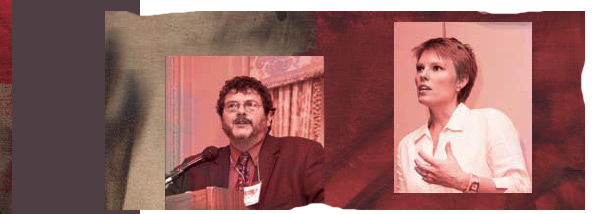|
|
OF UNIVERSAL RIGHTS AND CONFLICTS THAT THREATEN HUMANITY
continued
ALUMNI RETURN
Two alumni activists were on hand to
make presentations at the symposium:
Reed Brody, BA’74 (M), and Vanessa
Shields, BA’03 (M). Brody, counsel and
European press director for Human Rights
Watch, has worked for human rights
causes in places from Nicaragua to Tibet.
He led United Nations teams investigating
massacres in the Democratic Republic of
Congo and monitoring human rights in El
Salvador. He also coordinated an international
legal team to prosecute human rights
crimes in Haiti.
Now stationed in Brussels, Brody led
Human Rights Watch’s case against the
former dictator of Chile, Augusto Pinochet,
and he is coordinating the prosecution of
the exiled former dictator of Chad, Hissene
Habre. Brody is the author of the Human
Rights Watch reports “Getting Away with
Torture?”, “The Road to Abu Ghraib” and
“The United States’ ‘Disappeared.’”
At the conference, he spoke on “The
War on Terrorism and Its Consequences
for Human Rights.” Brody, whose father,
Ervin, was a professor of languages at
FDU from 1967 until 1985, began by
praising the University’s renewed emphasis
on preparing global citizens. “This conference
is an indication of the leadership role
Fairleigh Dickinson continues to play in
global affairs.”
Brody said that since the attacks of
September 11, 2001, the United States’
response has been “marked by policies
that curtail human rights.” He described a
range of human rights violations that include
the torture and abuse of detainees at
Abu Ghraib and Guantanamo Bay. He said
that such abuses undermine the war on
terror, undermine the protection of human
rights around the world and undermine
“our own values and identity as a nation.”
|
| |
Alumni symposium presenters included, left, Reed Brody, BA’74 (M), counsel/European press director
for Human Rights Watch, and Vanessa Shields, BA’03 (M), a peace studies scholar.
He explained that the “systematic
mistreatment of Muslim prisoners has
done more to create resentment against the
United States and to create sympathy and a fertile ground for terrorist actions.”
He added that such practices also make it
hard to urge other countries to respect human
rights. Finally, he said, our values are
under question. “We need to demand that,
in the name of who we are as a country,
we stop torturing prisoners.”
Vanessa Shields is a program manager
with Juarez and Associates, management
consultants, splitting time in England and
Washington, D.C., where the firm has an
office. She runs the group’s women in development
program.
“It’s fantastic to come back to FDU,
and it’s great to see so many students interested
in these issues,” she said, adding that
she also enjoyed seeing some of the professors
who inspired her like political science
professors Neil Salzman and Peter Woolley.
“We need to demand that,
in the
name of who we are as a country,
we stop torturing prisoners.”
— Reed Brody |
After graduation, Shields completed
her master’s degree in peace studies at the
University of Bradford, England, and then
worked for NATO, the European Union
and the United Nations. She is writing two
books on postconflict reconstruction: Beyond
Settlement, Volume I: Consolidating
Democratic Institutions in Conflict States,
and Beyond Settlement, Volume II: Coping
with Security in Conflict States.
At the conference, Shields focused on
the issue of child soldiers, along with FDU
Professor of Anthropology David Rosen,
the author of Armies of the Young: Child
Soldiers in War and Terrorism (see FDU
Magazine, Summer/Fall 2005).
Rosen emphasized the complexity of
the issue and briefly discussed the history
of child soldiers. While noting the horrible
plight of children forced to fight wars, he
added that not everyone shares the same
notion of when childhood begins and ends.
“The military and childhood have long
been viewed as perfect together.” Many
child soldiers, he added, are not victims
but in fact are happy to join the fighting.
But, “How do you deal with children who
have enjoyed being killers?”
Shields discussed the proliferation
of small arms and light weapons, which
creates more possibilities for children to
pick up arms and fight wars. The current
restrictions are very weak, she said, and
there is not a universally acceptable definition
of small arms and light weapons.
In response to the question of how
students can become involved in these issues,
Shields told them, “The most important
thing to do is to be engaged with the
world. Pay attention to what is going on
around you and don’t be isolated. You are
the future leaders.”
Next …
|
FDU Magazine Home | Table of Contents | FDU Home | Alumni Home | Comments
©Copyright 2007 Fairleigh Dickinson University. All rights reserved.
For a print copy of FDU Magazine, featuring this and other stories, contact Rebecca Maxon, editor, 201-692-7024 or maxon@fdu.edu. |


